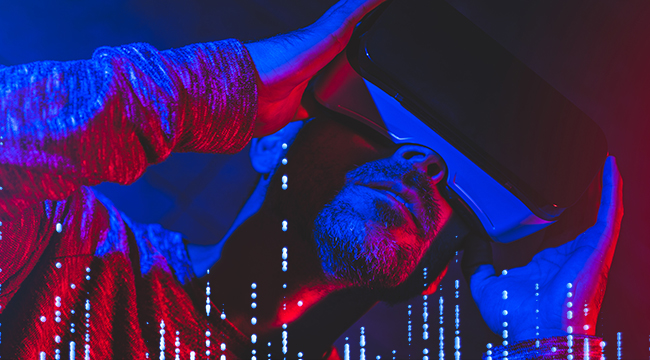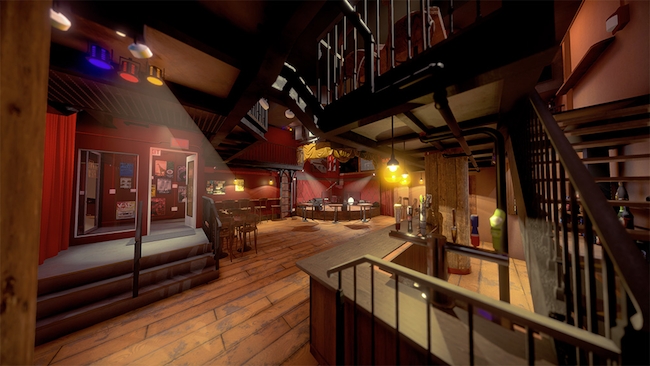
Whether it’s distance, juggling obligations or accessibility issues, there are handfuls of barriers that make experiencing live music difficult. The rise of virtual reality technology certainly presents an answer to this, but with a caveat: No matter how powerful the performance you’re witnessing might be, you’re not sharing that experience with anyone else.
Enter VR Company Endless Riff, who has arrived with a solution to the problem with a live music VR app experience that’s not only immersive, it’s social.
Live music is an inherently social experience, and when that person-to-person interaction is stripped away, it becomes passive. In combining the tools of VR with multi-player gaming technology, Endless Riff CEO Mark Iannarelli saw an opportunity to address what he sees as a very common problem many people share as they begin to get older, start families, and have fewer opportunities to engage with live music in a way they once did. “Many over the age of 30 are no longer able to bond with friends around music by going to concerts as much as they used to,” Iannarelli observes.
Fundamentally understanding live music as a social experience is the philosophy that drives Endless Riff. It’s a philosophy that not only addresses Iannarelli’s issue of feeling aged out of live music, but it speaks to the problem in a really nuanced way, emphasizing person-to-person connection above all else.“We believe music’s power is not only in its emotional trigger but its bonding results when this emotion is shared with others,” Iannarelli said. “We believe humans naturally demand shared emotional experiences, and music’s power to similarly trigger a group is the most powerful aspect of the medium.”

The Oculus Rift and Gear VR ready app (with Android, Apple and HTC Vive support rolling out in the future) allow users to exist in a virtual music community and lets those users then tap into live performances happening in real time. They start by creating their own personal avatar. That avatar then represents them virtually, and users can congregate and to watch content like music videos. When they’re ready to see a live performance, users move into a venue and can stream live concerts in 2D. They also have the option of inviting friends’ avatars into their virtual space to move around and talk with as they watch the same live show.
Beyond the personal, Endless Riff also emphasizes another kind of connection, scratching the itch of anyone who thrives on music discovery. “As we age, the nostalgia for our past and music’s indexing and triggering mechanism leaves a huge demand for myself and many others to reconnect emotionally around the music of our past, or the music discovery process itself.”
Inspired by the music festival business, Iannarelli wanted a way to harness that model by driving social interactions through VR. “This widely successful power to build an economy around friends and strangers connecting through music for a few days a year — and leave the fan craving for more the rest of it — has more legs than just current music festivals,” he mused. “It is an opportunity for the music industry and artists to capitalize on music as the biggest driver of “traffic” or attention in society and economies more widely.”
So far they have about 180 live shows under their belt. Right now, concerts are broadcast from Endless Riff’s “lab” venue, Rockwood Music Hall in Williamsburg, New York City. It’s an intimate space that has acted as a home for acts like Lissie, Lucinda Williams, Sharon Van Etten, Laura Marling, The Breeders and a host of other emerging artists.
Iannarelli reveals that the space was chosen because it was held in such high esteem by the app’s NYC based team. “Once we connected with owner Ken [Rockwood], we knew we had a perfect partner to work with,” he said.
Endless Riff refers to Rockwood as their “lab,” because while it’s offering them content for their app, the company are also using the space as a way to troubleshoot the functionality of the app and their technology. With it, they’ve been able to fine-tune their UX. Part of their earliest takeaways from launching at Rockwood was a proof-of-concept.
“Admittedly, that biggest lesson early on was that 2D content was relevant and a great experience when it is social,” Iannarelli explained. “[We also learned] that 360-degree video is best as an optional on-demand point of view and that things like too much 2D line-cutting amongst cameras is not a great experience at close distances to the screen in VR.”
The takeaways from establishing themselves at Rockwood aren’t just limited to technology, it’s also helped them hone their approach. “We learned that keeping it very simple has a lot of value,” Iannarelli reflected. “The way forward for the music industry is for us to make it about easy tools to on-ramp content and support the social experience across as many fans, and thus devices, as possible.”
Moving forward, Iannarelli says the biggest hurdle in seeing through their idea to make VR music festivals a reality is the price of devices, but that’s slowly beginning to change.
“Now that we are building a platform that makes the industry’s 2D content live streaming to social media even better in VR, we have simplified the supply-side for mass adoption,” he said. “Oculus and other device companies are now taking losses on hardware price points in order to drive adoption of the medium. Now it’s on Endless Riff and the broader music business to drive content into this device that will attract the fans.”

With touring and live music outpacing the recording industry in terms of overall numbers, and the steady increase in supply of stand-alone VR devices, Endless Riff is well positioned to fundamentally change how people experience live music.
“With 2D content demand sky-rocketing via social platform experiences and the cost of production and streaming dropping dramatically, we see the world becoming awash in what we call ‘Live Live’ and crowding out recorded video,” Iannarelli said. “We are at the infancy of a music business with a new opportunity for the artist to be live with their fans anywhere at any moment. What the industry does with that proximity is not only exponentially impactful on artist geographical reach and touch points, but also creatively explosive.”
Given the impact that music festivals have already had on the live music ecosystem, this next step might change the industry yet again — in an even more powerful way, when consumers catch up with the technology.






